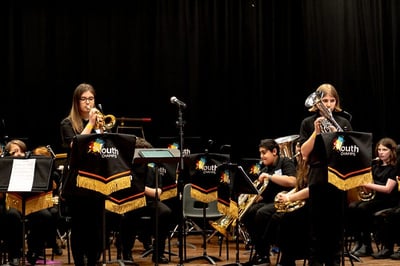Search for topics or resources
Enter your search below and hit enter or click the search icon.

In this case study Andy Harris - Brass Music Leader for Sheffield Music Hub - discusses the progression from the classroom to brass band competitions, using pBuzz to improve the pathway for his students.
The next generation of musicians in South Yorkshire are tapping into a rich cultural heritage and embracing wider opportunities.
As a trumpet player growing up in Leicestershire, I was fortunate enough to play with bands and orchestras, before becoming principal trumpet with the Leicestershire Schools Symphony Orchestra. I was given the opportunity to grow as a musician, and a platform to succeed in the band setting. And it is a pathway I want to encourage the students I teach across South Yorkshire to follow. I am currently the Brass Music Leader for the Sheffield Music Hub, teaching brass in a whole-class setting for more than a decade.
I am passionate about ensuring every child has access to an excellent standard of music education, and providing them with the right resources is crucial. Much of my work is delivered through Wider Opportunities, a whole class project which gives all primary children the chance to play an instrument as an integral part of National Curriculum music lessons. For many of the areas that I cover in Sheffield, these experiences would be impossible without Wider Opportunities. Some of the brass instruments that I work with would be out of the price range for many families, and the cost of one-to-one tuition would also be prohibitive.
Wider Opportunities is delivered in three or four stages:
I’ve worked with children from year two and up in the Initial Stage, but I’ll usually aim to deliver whole-class lessons in years three, four and five. Delivering brass instrument lessons to an entire class of young pupils has its challenges, so I use a brass development tool called pBuzz which removes initial barriers and allows the children to focus on producing a sound straight away, which is vital for keeping learners engaged and makes for quicker progression.
Using this approach, the children are grounded in the fundamentals of brass and can produce a clear, quality sound. Giving the children this primary experience of brass accelerates their progression to a typical brass instrument like the cornet, and the number of children continuing into the Transition Stage is significantly increased. At one primary school where I teach, out of ninety-five children I have taken around a third from pBuzz to pCornet, to brass transition lessons. Five years ago, that number was just four. Using this model has enabled more children to start their journey sooner, leading to them becoming more advanced brass players.

It is a brass strategy I have seen rolled out on a wider scale in Wales. The National Plan for Music Education in Wales sought to give every child in year three the chance to learn a musical instrument, as well as offer pathways for children to continue their learning. The Welsh government commissioned pMusic Cymru Consortium, a social enterprise seeking to broaden musical participation in your people, to deliver 53,000 instruments, one for each Year 3 child to every Welsh primary school. This has enabled all Year 3 pupils to try entry-level brass and woodwind instruments as part of the recently launched National Music Plan for Music Education in Wales. This is a plan that mirrors my own ambitions: to give every child in England a chance to experience music and to let their love of music blossom.
There are a number of success stories that I have witnessed during my time at Sheffield Music Hub and delivering Wider Opportunities classes. The brass band has helped steer children away from trouble and into a new passion for performance. At one of our showcase events at Cutlers’ Hall in the city, a pupil I was teaching told me “I shouldn’t be here: I’m just a kid from Southey Green”. That student has since gone on to play a cornet solo at the National Youth Brass Championships and is studying GCSE Music. But there are so many more children that we are yet to reach.
To create a new golden generation of musicians, we need to give all children in England a chance to play an instrument. The musical instrument funding made available by the Department for Education, through the National Plan for Music Education, must deliver for every child. Giving every child access to a primary instrument and quality teaching and resources, as has happened across the border in Wales, will ensure that no child misses out on the chance to shine.
Musical education can bring opportunities, build friendships, provide a host of transferable skills and, in my case, lead to a rewarding career. If every child is given an opportunity to experience the joy that playing an instrument can bring, the future is a bright one for young musicians in Sheffield and beyond.
You can find out more information about Sheffield Music Hub on their website: www.sheffieldmusichub.org
Topics: